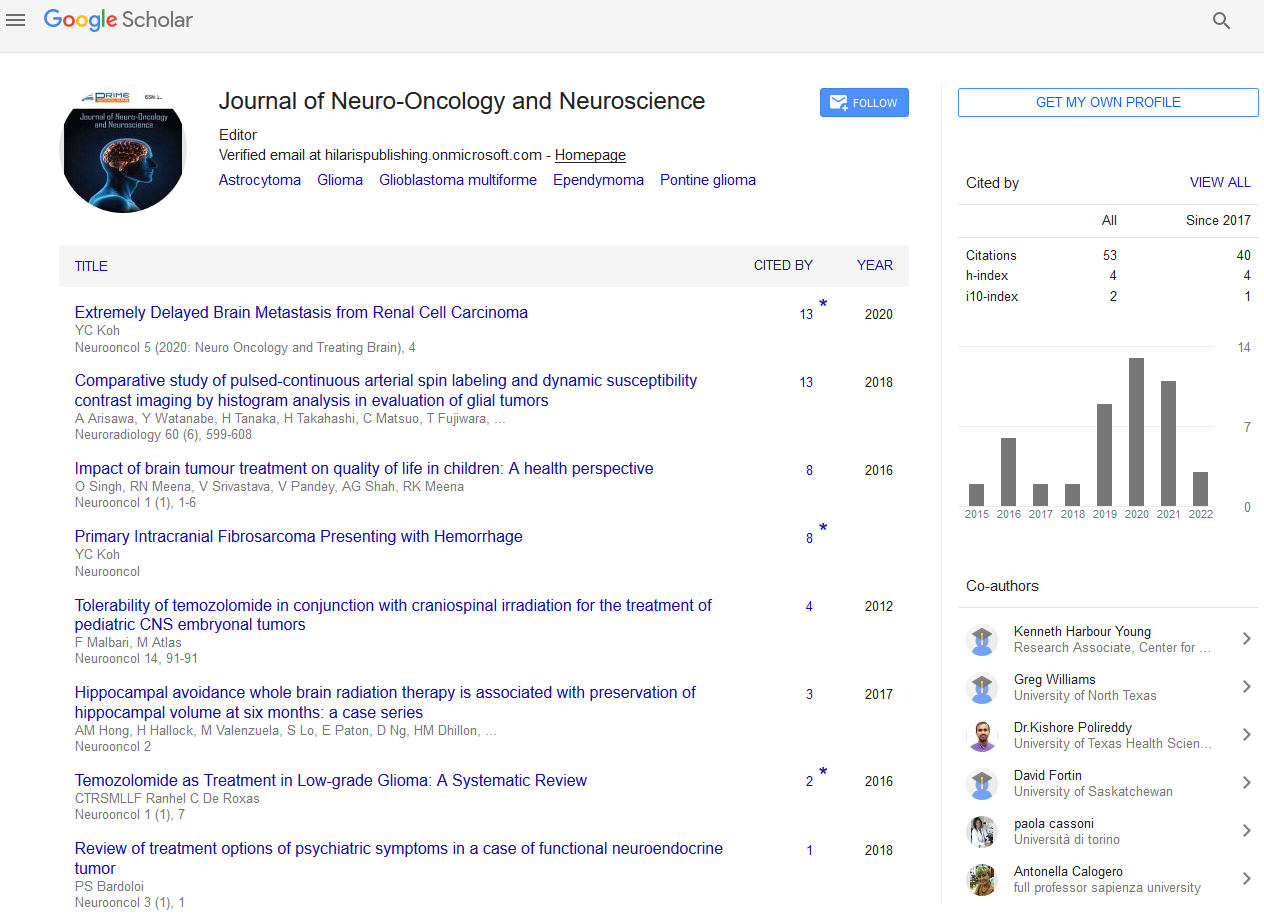Short Communication - (2024) Volume 9, Issue 2
Immunotherapy for Quality of Life and Palliative Care in Neuro-Oncology
Min Choi*
Department of Sciences, Shanghai Jiao Tong University, China
*Correspondence:
Min Choi,
Department of Sciences, Shanghai Jiao Tong University,
China,
Email:
Received: 29-May-2024, Manuscript No. IPJNO-24-20754;
Editor assigned: 31-May-2024, Pre QC No. IPJNO-24-20754 (PQ);
Reviewed: 14-Jun-2024, QC No. IPJNO-24-20754;
Revised: 19-Jun-2024, Manuscript No. IPJNO-24-20754 (R);
, DOI: 10.21767/2572-0376.9.2.20
Introduction
Immunotherapy has become a groundbreaking approach in
the treatment of various cancers, including brain tumors.
While its primary focus is often on prolonging survival, the
impact of immunotherapy on the quality of life and palliative
care in neuro-oncology is increasingly recognized as an
essential aspect of patient management. This article explores
how immunotherapy contributes to enhancing the quality
of life and provides palliative care benefits for patients with
brain tumors. Immunotherapy leverages the body’s immune
system to target and destroy cancer cells. These treatments
aim to improve the prognosis for patients with aggressive brain
tumors such as glioblastoma multiforme. Immunotherapy
can help manage and reduce symptoms associated with brain
tumors. For instance, oncolytic viruses not only target cancer
cells but can also stimulate an immune response that alleviates
tumor-related symptoms such as headaches, seizures, and
neurological deficits. By reducing the tumor burden, patients
often experience a significant improvement in their daily
functioning and overall well-being.
Description
Cognitive impairment is a common issue for brain tumor
patients, severely affecting their quality of life. Immunotherapies
that effectively target and shrink tumors can help preserve
cognitive functions. Moreover, research is ongoing into
immunotherapeutic strategies that specifically protect or
restore cognitive abilities impacted by both the tumor and
its treatment. The psychological burden of living with a brain
tumor can be overwhelming. Successful immunotherapy
treatments can provide patients with a sense of hope and
control over their disease, leading to improved mental health.
Additionally, some immunotherapy approaches are associated
with fewer side effects compared to conventional treatments
like chemotherapy and radiation, further contributing to better
psychological well-being. Pain is a significant concern for many
brain tumor patients. Immunotherapy can reduce tumor size
and associated inflammation, leading to decreased pain. For
example, checkpoint inhibitors and CAR T-cell therapies that
achieve partial or complete tumor responses can directly
impact pain levels, providing substantial relief and reducing
the need for narcotic pain medications. Traditional cancer
treatments often come with debilitating side effects that can
diminish the quality of life. Immunotherapy, particularly when
tailored to the patient’s specific tumor profile, tends to have
a more favorable side effect profile. This reduction in adverse
effects means patients can maintain a better quality of life
during treatment. While extending survival is a primary goal, it
is equally important that this extended time is of good quality.
Immunotherapy has shown promise in not only prolonging life
but doing so in a manner that allows patients to enjoy more
meaningful and productive time with their families and friends.
Treatments that minimize hospitalizations and allow patients
to continue with their daily activities contribute significantly to
the quality of life [1-4].
Conclusion
Immunotherapy in neuro-oncology offers more than just hope
for extended survival; it significantly impacts the quality of
life and palliative care. By managing symptoms, preserving
cognitive function, and improving psychological well-being,
immunotherapy provides a holistic benefit to brain tumor
patients. As research advances and personalized approaches
become standard, the integration of immunotherapy into
palliative care will likely continue to evolve, offering patients a
better quality of life during their treatment journey. Continued
research into combining immunotherapy with other modalities,
such as targeted therapies, radiation, and supportive care
strategies, holds promise for even better outcomes. These
combinations may offer synergistic benefits that enhance both the efficacy of the treatment and the quality of life for patients.
Acknowledgement
None.
Conflict Of Interest
The author declares there is no conflict of interest in publishing
this article.
References
- Majd N, Dasgupta P, de Groot J (2021) Immunotherapy for neuro-oncology. Adv Exp Med Biol 1342:233-258.
[Crossref] [Google Scholar] [PubMed]
- Rahman M, Parney I (2021) Journal of neuro oncology: Immunotherapy for brain tumors. J Neurooncol 151(1):1.
[Crossref] [Google Scholar] [PubMed]
- Khanmammadova N, Islam S, Sharma P, Amit M (2023) Neuro-immune interactions and immuno-oncology. Trends Cancer 9(8):636-649. [Crossref]
[Google Scholar] [PubMed]
- Reardon DA, Gilbert MR, Wick W, Liau L (2015) Immunotherapy for neuro-oncology: The critical rationale for combinatorial therapy. Neuro Oncol (Suppl 7):vii32-vii40.
[Crossref] [Google Scholar] [PubMed]
Citation: Choi M (2024) Immunotherapy for Quality of Life and Palliative Care in Neuro-oncology. Neurooncol. 9:20.
Copyright: © 2024 Choi M. This is an open-access article distributed under the terms of the Creative Commons Attribution License, which permits unrestricted use, distribution, and reproduction in any medium, provided the original author and source are credited.

